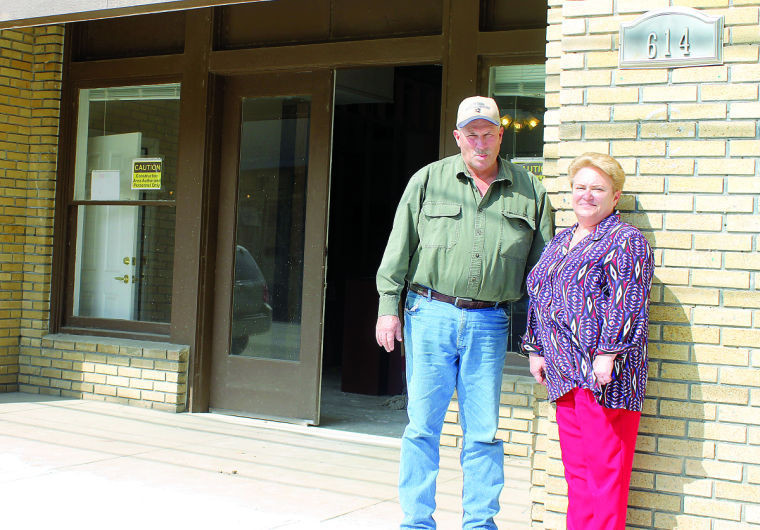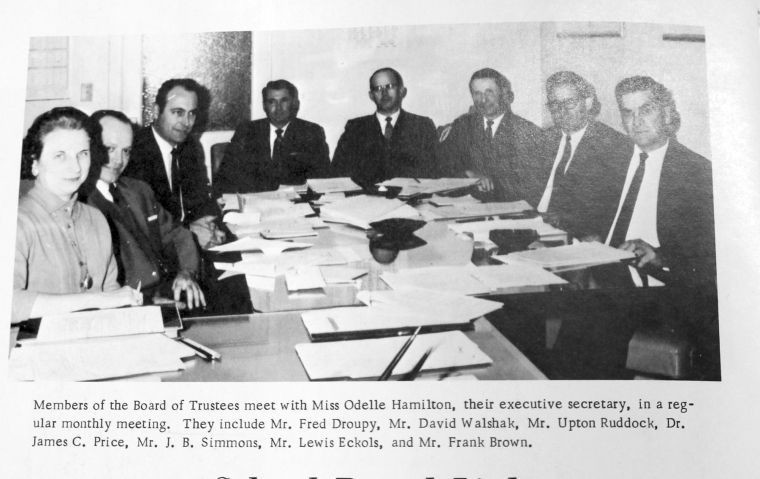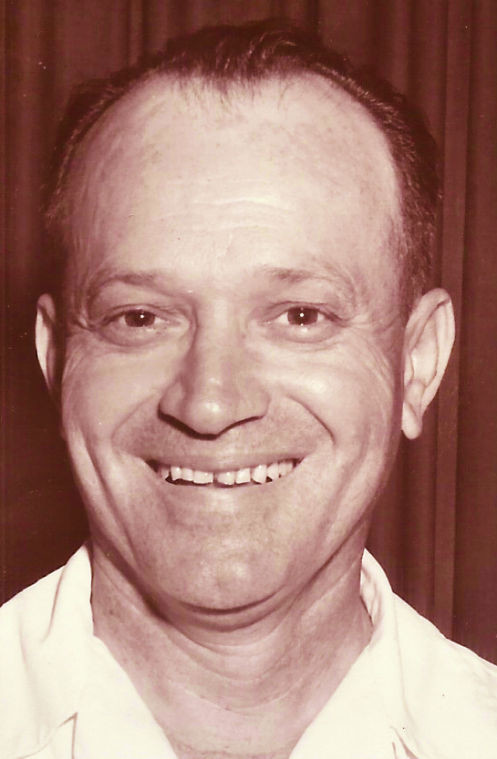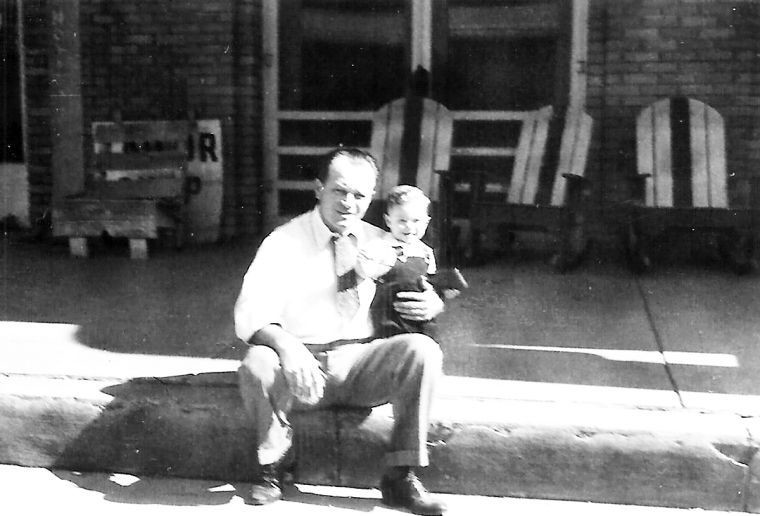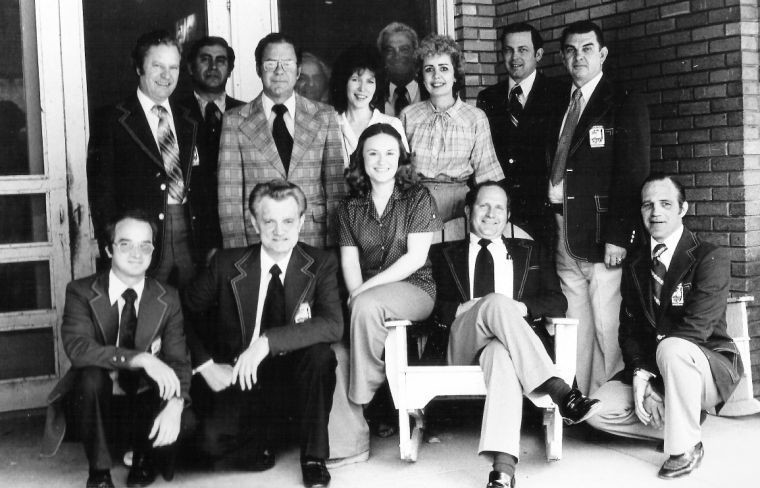Growing up at the Alcalde Hotel
One hundred and eight years ago, Aref Droupy made his way to the United States of America with a vison: To start a legacy for his family.
These dreams that he had became public Feb. 19, 1925 when his wife, Mrs. Helen Droupy began transacting the purchase of a piece of property on St. Paul Street in Gonzales.
On April 20, 1925, the Gonzales Inquirer lists the property as being recently sold to Mrs. Helen Droupy by Vernon Conway and John Conway Jr. at a price of $4,150. A vendor’s license was also granted to her in this transaction.
A the time of the transaction the Droupys knew they wanted to build a large brick building and were undecided as to either build a theater or a hotel. Gonzales was growing rapidly and the oil boom was causing noticeable increases in population. So Mr. Droupy along with the help of the Chamber of Commerce and his business manager B. B. Hoskins Jr. (the brother of Dudley Hoskins) decided the hotel would be the wisest choice. Finally papers were signed July 9, 1925 enabling Helen and Aref Droupy to builde a three-story, 40 room hotel.
Construction began 14 days later and Cap Smith was the contractor. The hotel was to be built at a cost of $40,000 including all furnishing. It would have a 44-foot frontage and be 108 feet deep. It would have a plate glass front with 27-by-7 foot vestibule in the center, serving as the lobby. The coffee shop would be 10-by-33 feet and will adjoin the lobby on the south side, a 20-by-42 foot dining room, and a kitchen in the rear of the hotel. There would be no elevator as it would only be three stories tall. The walls were to be strong enough to support one or two stories more, if more space was ever needed.
Mr. and Mrs. Droupy immigrated from Beirut, Syria, which is now Lebanon, in 1906 on a ship with their two oldest children, Joe and Emma.
Deidra Voigt, granddaughter of Aref and Helen Droupy, recalls a story told of their arrival to the U.S. and how customs officials through paperwork changed their names from Drouby to Droupy. Because of the Droupys unfamiliarity with customs laws, the name remained changed and he became a U.S. citizen several years later under the name of Aref Droupy.
On Monday, July 27, 1925, the first concrete was poured for the new hotel. Aref Droupy had such a temper that a laborer mixing cement incorrectly was fired on the spot with some harsh words used.
Aref had some contracting knowledge because his father and grandfather were also contractors in the old country.
On March 26, 1926, the large modern hotel was complete — except for the name. Mr. Hoskins was not only Aref’s business manager, but also his close friend and Mr. Droupy respected his opinion on most matters of importance.
So when Mr. Hoskins suggested naming the hotel The Alcalde, which was a Spanish word for mayor or leader, the name was quickly adopted and the Hotel Alcalde opened for business shortly thereafter.
The name also contained some historical significance as the word “Alcalde” was also the name used for the ruling officers of Gonzales in the days of DeWitt’s Colony.
Mr. and Mrs. J.S. Hood ran the hotel and coffee shop for about one year, followed by a family named Thayer. It was then leased to a man named Wruck from San Antonio. This lasted until the early 30s when the Droupy family, now with several more children, took over the business.
The children were Joe, Emma, Friedman, Fred, Roger, Rosalee and America named in appreciation for their country.
The oldest son Joe went into the café business in Austin and Roger and Fred took over the hotel until the war took them away to serve their country.
During the war, Helen Droupy and her daughter Rosalee operated it until the men returned in 1945. In the beginning years, the Hotel Alcalde was modern in every sense. Many residents can recall when the automobile was brand new to Gonzales and many families would come to town in buggies, wagons or on horseback and tie their horses out front of the hotel. One modern convenience was the room service which could be obtained by ringing a bell twice if on the second floor or three times for the third floor. Then the porter would go to each room and provide the service to those who could afford the luxury.
The lobby was often filled with various salesmen who would stay there to sell their wares in the sample room. In the 40s and possibly even in the late 30s, a cotton buyer by the name of Sloane Smith had an office set up where the barber shop would eventually be. He purchased cotton from local farmers and at almost any given time there was at least one hot domino game in the lobby usually played between the salesman staying there. Customers boarding there could often get a shoe shine for a price of 10-20 cents a shine.
The Hotel Alcalde was always a place of high controversy mostly due to the character of the man that ran it.
One story told by many concerned Aref Droupy in 1931 when once again ruled his actions. He had purchased a new 1929 Buick which he claimed was bought with a factory defect. The company would not come to fix it so he refused to make the payments. When the time came to repossess the car, Mr. Droupy would not permit them to take it just so it would be resold to someone else. So in order to prevent them from repossessing it, he took an ax to it and chopped the car almost beyond recognition. Consequently, the car could not be resold and was left sitting there by the side of the road.
His son Fred was also a strong character and often angered resident with his outspoken attitudes and beliefs. For many years the coffee shop would fill up with customers by 6 a.m. and shortly afterward a loud discussion would occur concerning happenings around the town. Of course, Fred Droupy would be right in the middle stating his opinions on these matters whether anyone would want hear them or not. This outspoken character of Fred Droupy would lead him to become a well respected man in the Gonzales community. In fact, the townspeople dared him to run for the school board over a dispute on taxes. He was the first write-in candidate to be voted in and won by nearly 1,000 votes.
Many thought he would cause the school board members nothing but trouble, but according to Fred Havel, the school’s superintendent for Gonzales, Fred Droupy became the best school board member Gonzales ever had. He was honest and outspoken but was on the children’s side at all times. Often to get a point across, he brought in the Bible to settle an issue by reading a passage from the New Testament. So that tells me he wasn’t ashamed of the Gospel.
The Hotel Alcalde witnessed many discussions by townspeople and also had many celebrities come by for a night’s stay. Allen Jenkins, a movie star during the silent screen B movies, stayed the night. In 1938, the famed outlaws Bonnie and Clyde stayed there but were forced to flee through the windows in the pre-dawn hours to escape the law. Also they signed alias names on the register, many remember the couple and all agreed it was them who stayed there that night.
The restaurant and coffee shop were always an added feature in the hotel and for many years a man could pay a flat rate for both room and board. Various clubs and organizations met there each week and were provided breakfast or lunches during these meetings.
During my early years, from 1948 to 1977, I remember the Quarterback Club met there each morning to discuss the games during football season. I believe they were the ones who eventually brought Elvis Presley to Gonzales in 1955 and he performed in the baseball field by the golf course.
I remember back when I was about 10 that our waitress remembered about these two men that came in late one afternoon to eat and get some shut-eye.
She told me, “Your dad had a little bit of meat left over and gave it to these young boys. One of the boys told Elvis, ‘Sure does taste like your Momma’s cooking. Elvis said, ‘I sure do miss Momma’ and he began to shed some tears.”
She didn’t know who he was, except his name was Elvis and she didn’t forget that name. Several years later, this guy came out with two songs that she heard on the radio, “Heartbreak Hotel,” and “That’s Alright, Mama.”
Sort of a coincidence, but no telling how many hotels he stayed in during the next few years, but the Alcalde was one of them.
As I look back when was about 8 or 9, dad started me out in the coffee shop serving coffee, cooking doughnuts in the doughnut machine, standing the wooden coke boxes.
When I was about 12, I would help out as a night boy to check in the customers who came in after 10 o’clock. I slept on a roll-away bed in the hallway. They would ring a bell, I got their name, took their money and carried their suitcase to their room and handed them the key. This went on for about a year and then dad hired Stanley Nance, then Sammy Roeber, and finally Ernest Rabel. They worked there during their junior and senior years. Sammy told me he really like it because he got paid plus he got to eat some good food.
Many folks seem to get all worked up about the celebrities that stayed there, but the real stars that stand out are the customers that came in every day faithfully.
The day starts early at the hotel, as early as 5:15. Dad goes into the kitchen. Turns on the grill, makes the coffee, turns the fans on and the first three men were there in their cars waiting for dad to open the doors. Charlie Chenault, Ezzell Ball and Fred Kokernot Jr. Fred Jr. wouldn’t stay but about 15 minutes and get a fast cup of coffee and leave, but Charlie and Ezzell ate breakfast.
All these folks are the ones who helped Fred Droupy to become the proven vessel and brought out his true character. One particular friend of my dad was Edward Reese. He would sit there at the middle table in the coffee shop smoking his cigarette, and he knew how to set Fred off on a tangent. He egged him on.
After he got him primed up, he would sit there and listen to Fred talk about this and that. Smiling as he sat there listening to Fred, he would get up and head back to the Inquirer, a good friend for years. Then the rest of the staff would come down for nickel coffee and listen to him jaw. They included Hugo Ehrig, Mrs. Jo B. Farmer, Sue Grauke, Joan Ackers, Mr. Malaer and Rusty Lehnert and then the men at the printing press, Doug Staton, Clarence Vyvjala, Emil Broz, Joe Green and James Hendershot.
Then the Production Credit Association crew came down, which were Rufus Floyd, Gordon Seidel, Frank Boehm, Warren L. Moore, J. T. Marrow, Roger Gray and Cecil Morris. The ladies were: Mary Ellen Scheske Hurt, Elsie Pouncey and Mrs. Janelle Kline and Dolores Zella. They all enjoyed hearing the scuttlebutt. Dad was always up on all the real important issues.
Then there were the guys that liked football: Coach Peterson, Jerry Bivins, Eddie Burrows, Otto Gindler, Arthur Ratliff, Vic Brown and Kenneth Malatek. These were the steady customers.
Dr. Sievers would come in occasionally and then Sterling Kelly, Zane Brisco, Ralph, Bennie and Buddy Davis (the cattle buyers), Ted McCavitt, Wallace and Maurice Harrell, Bill Ploetz (they ran Harrell Cattle Company), then Fred and Roy Halamicek (who owned Halamicek Auto. Their motto was “Try us we may have it.”)
I remember an incident during the school year of 1957. Several guys from the school who liked home-cooked meals asked my dad if he would cook them some stewed rabbits if they shot them. About six or eight of the country boys went out one night and killed about 25 rabbits and brought them early the next morning.
Dad had the porter clean the rabbits and chilled them for 24 hours and then he cooked them in onions and bell pepper and made some gravy and those good old hot rolls and served them on the lunch the next day as one of the meats.
Is your mouth watering yet? I can just taste these juicy, fall-off-the-bone good vittles today. Even the young men at school enjoyed these good old days at the Alcalde. Innocent years when you could leave the windows rolled down and not worry about much then.
One day, some big old bruisers cornered little Stanley Nance in the parking lot between the Inquirer and the PCA. They were picking on him and trying to pick a fight with him. Dad heard the commotion and went up there. He refereed the fight. But, they were going to fight Stanley one at a time. With dad in his corner, his confidence was up, and they others were whipped before they started because they were intimidated by dad. They were exposed for their rude behavior. Once Stanley landed some good punches in the face of the first two guys, the other guy just didn’t want to fight and said, “You win.”
It was wonderful when I was young. You could have a friendly fist fight and then brush off your pants, shake hands and walk off and still be friends. Nowadays, they want to cut you, or shoot you from a car like a coward would do.
Looking back at some of the men and women that were the real stars were Oscar Filip and Mr. Richter that ran their taxi out of the hotel. Dudley Hoskins who owned the menswear owned the corner. He ate at the hotel six days a week and loved dad’s beef stew on Saturday.
How many of you remember Mr. Hunt who rant the Pantry? And then there was Gussie Gurinsky who lived in room 214. She was a character. Dad couldn’t stand the way she tore up the newspaper. You couldn’t read it after she got through with it.
Mr. Pud Guardian loved to play dominoes and was the uncle to the man who owned the Guardian Ranch east of Kokernot Ranch. Her reminded me of Captain Kangeroo.
Then Sox Nelson and Mack Nelson, Bubba Menking, and Henry Majefski, Homer Neitsch, Ruben Neitsch, Warren DuBose, Frank DuBose, Chic DuBose — she was the one that was on the Johnny Carson Show. She was the egg lady.
Bill White, Mr. Beard who lived at the hotel worked for Seydler-Hill Funeral Home. He enjoyed going quail hunting with dad out at the J.B. Wells Ranch. And they all enjoyed visiting dad at the hotel.
Then Dr. Denmann and his lovely wife Baby were also patrons who came in with their family to eat a good steak in the evening. The Tate sisters from Boothe & Lewis also visited occasionally at the Alcalde.
What about Al Berry, the guy that carried his sheep named Wanda to cities all over Texas to auction her off to raise money for Warm Springs at Ottine. Then the cities would give him the sheep back so he could pursue his quest. William Baron was our town barber over by Michelson’s Café on St. Joseph Street. Anyone who was anyone made stops periodically just to get the latest scoop in the coffee shop. The Alcalde was the place to hear all about it.
And what about those lunches that sold for 65 cents. Usually a 50 cent piece, a nickel and a dime. Usually the lunches were a choice of meat, three vegetables, a biscuit or a roll, a salad and a dessert, iced tea or coffee. Believe it or not, good home cooking. No one could top that, except mama or grandma.
Mr. Fred Droupy, mastermind of the Alcalde Hotel, became a legend in his own time. He was a blessed man to have friends like he had for all those years.
Andrew Carnegie said, “No man can become rich without himself enriching others.
Andrew must have known what he was talking about. At one time he had 43 millionaires working for him.
It is the individual who is not interested in his fellow man, who has the greatest difficulties in life, and provides the greatest injury to others. When you work with people it is a lot like mining gold. When you mine for gold you must literally move tons of dirt to find a single ounce of gold, however you do not go in looking for the dirt, you look for the gold. It is the same way when you want to develop people to their full potential you must look for the gold and when you find it, refine it and shape it. The greatest good we can do for others is not to share our riches, but to reveal theirs to them.
This was Fred Droupy. He built it on a good foundation. The word of God.
He put these truths in us kids through a good example. We are where we are today because of decisions we made yesterday, last month and last year. Some poor soul wants to blame the government or someone else. That person is believing a lie.
The Alcalde Hotel was a success because of the favor he received from the Lord. He was a people person and the people knew that he cared for them.
In July 1977, dad departed this earth and reunited with his wife in glory where they are enjoying fellowshipping with our Lord. Then in 1978, Deidre Voigt Droupy became the CEO of the Alcalde and ran it successfully for 20 years. She also had people skills instilled into her and graces from the Lord, to perform the task at hand.
After Walmart open in 1978, and the second bypass went around downtown in the mid-80s, it took a toll on the downtown businesses and the hotel business.
JB White, Booth & Lewis, Duke and Ayers began to close up, other businesses began to move out to the bypass. During all this, the Alcalde continued to operate until middle 1990s.
Deidre Voigt and all the graces and gifts instilled her are coming into full fruition for the task that is about to occur in the near future. The Alcalde Hotel was the proving ground for both Fred Droupy and his daughter. Once Deidre realized that it was time to close the hotel. She made mention to several people that it was time. She closed the hotel in April 1998. It was sold and has sold several times since.
I for one, along with our dad Fred Droupy and my sister Deidre, would like to thank the new owner for the interest that you have taken in the remodeling of the Alcalde Hotel.
If he were here, he would be proud that someone was taking the interest in spending several million dollars in bringing it back to life.
Fred Droupy left a good example, hard work, commitment, charisma, love for people and a strong a personality.
We salute you in your venture for what is ahead and wish you all the best.
Comments

